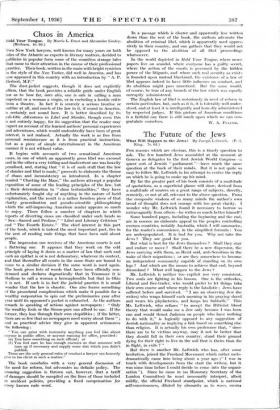Chaos in America
Two New York lawyers, well known for many years on both sides of the Atlantic as experts in literary matters, decided to publicise in popular form some of the countless strange tales
that came to their attention in the course of their professional practice. Their book, written in the main with bright cynicism
in the style of the New Yorker, did well in America, and has
now appeared in this country with an introduction by " A. P. Herbert, M.P."
The dust-jacket suggests, though it does not explicitly affirm, that the book provides a reliable guide under English
law as to how far, inter alia, one is safe in calling a man impotent or a woman a virgin, or in excluding a hostile critic from a theatre. In fact it is scarcely a serious treatise or outline at all, and much of the law in it, if sound in America, is certainly not sound here. It is better described by its sub-title Adventures in Libel and Slander, though even this is not entirely happy, for its suggestion that the reader may expect an account of the learned authors' personal experiences and adventures, which would undoubtedly have been of great
interest, is not realised. Actually the work is as free from personal reminiscence as it is from practical instruction, but as a piece of simple entertainment in the American manner it is not without value.
It begins with accounts of two sensational American cases, in one of which an apparently gross libel was excused and in the other a very trifling and inadvertent one was heavily penalised, and, stating that " it is of such stuff that the law of slander and libel is made," proceeds to elaborate the theme of chaos and inconsistency so introduced. In a chapter headed " Charting the Maze," the authors attempt a popular exposition of some of the leading principles of the law, but i n their determination to " shun technicalities," they have unfortunately fought shy of anything in the nature of lucid explanation, and the result is a rather formless piece of that chatty generalisation and pseudo-scientific philosophising which the self-improving American reader appears so much to enjoy. There follow a number of chapters in which reports of diverting cases are classified under such heads as " Sex—Sacred and Profane," " Libel and Literary Criticism " and " The Fourth Estate." The chief interest in this part of the book, which is indeed the most important part, lies in the zest of reading rude things that have been said about people.
The impression one receives of the American courts is not a flattering one. It appears that they work on the odd principle of laying it down as a matter of law that such and such an epithet is or is not defamatory, whatever its context, and that thereafter all courts in the same State are bound to come to a similar decision if the same word is used again.
The book gives lists of words that have been officially con- demned and declares dogmatically that in Tennessee it is
libellous to call a woman a hermaphrodite but that in Ohio it is not. If such is in fact the judicial practice it is small wonder that the law is chaotic. One also learns something of the procedural complications which make it possible for a
wealthy corporation to spin out the preliminaries year after year until its opponent's pocket is exhausted. As the authors remark in speaking of actions against newspapers : " Only the wealthy fools or the Simon-pure can afford to sue. If the former, they lose through their own stupidities ; if the latter, there are so few that no newspapers need worry about them ; and as practical advice they give in apparent seriousness • the following :
" You can print with immunity anything you feel like about anyone in public office, or anyone running for office, provided :
(a) You have something on such official ; or -
(b) You feel sure he has enough enemies so that someone will turn up if necessary and supply some dirt which you didn't. publish.
These are the only general rules of conduct a lawyer can honestly give to his client in such a matter."
The book concludes with a very general discussion of the need for reform, but advocates no definite policy. The amusing suggestion is thrown out, however, that a tariff of damages should be'compiled on the lines of those inclucled in accident policies, providing a fixed compensation -for every known rude word.
In a passage which is clearer and apparently less written down than the rest of the book, the authors advocate the abolition of criminal libel, which is apparently used oppres- sively in their country, and one gathers that they would not be opposed to the abolition of all libel proceedings whatsoever.
In the world depicted in Hold Your Tongue, where news- papers live on scandal, where everyone has a guilty secret, where the action of the courts is governed by the hidden power of the litigants, and where such real security as exist-i is founded upon mutual blackmail, the existence of a law of libel appears indeed to have little influence on conduct, and its abolition might pass unnoticed. But the same would, of course, be true of any branch of the law which was equally corruptly administered.
The English law of libel is notoriously in need of reform in certain particulars, but, such as it is, it is tolerably well under- stood, and at least it is intelligently and honestly administered by respected judges. If this picture of American conditions is a faithful one there is still much upon which we can con-






































 Previous page
Previous page